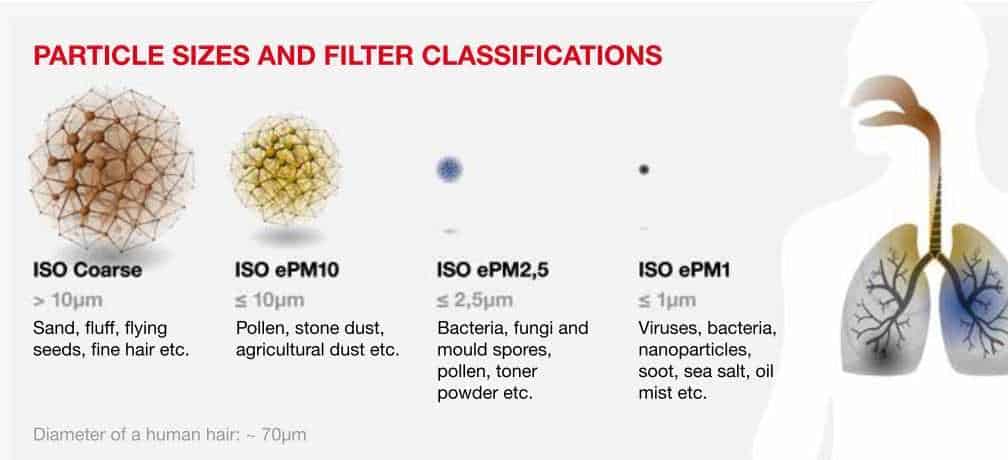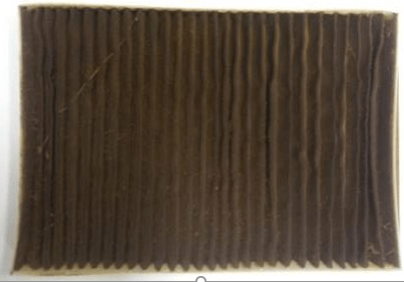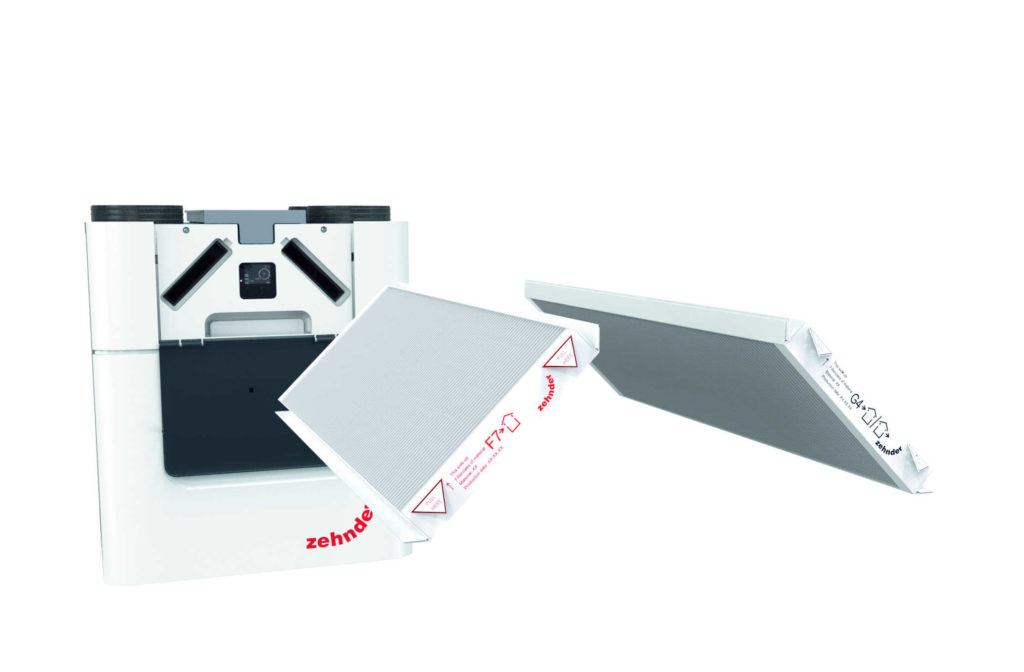Why do MVHR systems need filters?
All MVHR (mechanical ventilation with heat recovery) systems need 2 filters, 1 for the intake and 1 for the extract air. These filters protect the system’s heat exchanger and fans from blocking up with dust and other air-borne particles and debris. There is also considerable evidence that the use of MVHR filters improve the internal air quality of a home.
Which filters should I use?
Intake air filter
- Option 1
G4 Filter: Regular filter for incoming air.
- Option 2
F7 Filter: Filters finer dust, particles and spores out of the incoming air. Slightly more expensive than the G4 filter but good for hayfever sufferers or for use in polluted area. See ‘What do the filters filter out’ section below.
- Option 3
Blank filter frame : If you are using a Frost protection pre-heater (a black box on the intake duct), which filters the air before it comes into the MVHR system, then there is no need to have an additional filter in the MVHR system intake. However you do need to put something in the slot for the MVHR intake filter to fill the gap and prevent air leakage. You can save money by using a blank filter frame in the intake slot and install an F7 grade filter in the Frost protection pre-heater box and a G4 filter in the MVHR system extract. This will mean that in the future, you will only need to buy 2 filters instead of 3 as the frame doesn’t need changing. Please ring us if you need any advice on this.
Extract air filter
G4 Filter: Regular filter for extract air.
What do the filters filter out?
ISO 16890 is a new standard for filters which classifies filters in different grades as to which types and sizes of particles they capture.

| Filter grades | Typical particulate matter | Particle size |
| ISO Coarse | Larger particles such as sand, fluff, flying seeds or fine hair. | Filtering an average less than 50% of particles sized 0.3 – 10 μm |
| ISO ePM10 | Pollen, stone dust or agricultural dust. | Filtering an average of more than 50% of particles sized 0.3 – 10 μm |
| ISO ePM2.5 | Bacteria, fungal and mould spores, pollen or toner powder | Filtering a minimum of 50% of particles sized 0.3 – 2.5 μm |
| ISO ePM1 | Viruses, combustion particles, tobacco smoke, nano particles, air-borne sea salt, oil mist | Filtering a minimum of 50% of particles sized 0.3 – 1 μm |
How do the G4/F7 filters perform against the new standards?
- G4 Filter meets ISO Coarse standard
- F7 Filter meets ISO ePM1 standard
What filters do I need for Frost protection units?
Either an F7 or a G4 filter can be used in your Frost Protection unit, which filters air before it comes into the MVHR unit. Many MVHR systems now have integral frost protection units. If you do have a separate Frost protection unit you can save money by using a blank filter frame as the intake filter for your MVHR unit as the Frost Protection unit is already filtering the incoming air.
What should I do if I live in an area with high air pollution?
The F7 filter does help filter out some particulates and air pollution. However, for high traffic pollution we would recommend the addition of a NOX filter box to your MVHR system, which filters nitrous oxide from air entering the building before it goes into the MVHR intake and uses an active charcoal filter to filter out dangerous gases. If you are interested in having this additional protection, please get in touch to discuss options.
How often should I change my MVHR filters?
 It is recommended to check filters every 3-6 months, depending on the use of the system, the environmental pollution and the dust load. If the system is installed in a building site then building dust might mean you need to change the MVHR filter sooner at first. It is really important to keep on top of filter replacement to protect the MVHR heat exchanger and ensure the continued the silent working of the system.
It is recommended to check filters every 3-6 months, depending on the use of the system, the environmental pollution and the dust load. If the system is installed in a building site then building dust might mean you need to change the MVHR filter sooner at first. It is really important to keep on top of filter replacement to protect the MVHR heat exchanger and ensure the continued the silent working of the system.
How do I tell if my MVHR filters need changing?
There is an automated warning light on the MVHR control panel, which you can set to come on after a certain period of time (eg 3 months) has elapsed. The best way to tell if filters need replacing is if you can’t see any light when looking through the filter or there is a reasonable layer of dust on the filter. A tell-tale sign that your MVHR filters are definitely overdue with changing is if the system starts getting noisy. This is because, with clogged-up filters, the MVHR system is finding it harder to push air around the building and so is noisier.
Do I need a filter for kitchen extract fans?
We supply a low-cost fleece which acts as a filter to prevent dust and grease from entering the MVHR system in the Kitchen. These should be changed frequently depending on what you cook, if most of your food is boiled they will not need changing as often, if you fry a lot of food they will need changing regularly. You can easily see the filter in our Kitchen extract grill so by simply looking at the filter, if it looks dirty and greasy it will need changing.
What maintenance do I need to do on my MVHR system?
If you keep on top of your filter changes, there is very little maintenance to be done.
After 5 years we would recommend cleaning the extract air valves in wet rooms such as bathrooms and kitchens. This would involve unscrewing the air valves and wiping around the openings with a damp cloth. Sometimes people recommend washing the MVHR heat exchanger in warm soapy water and air drying it. This shouldn’t be necessary if filter changes are kept on top of but it doesn’t do any harm. If you spot any mould on the heat exchanger that is a sign that the MVHR system has been switched off for a length of time and so air has not been moving through the system enough. We never recommend turning the MVHR system off. If you are leaving the property for a substantial length of time, you can leave the system in ‘unoccupied mode’, which will keep a very low air flow rate in the system and used very little energy in doing so.
Occasionally the bearings on the MVHR unit fans can fail and would need to be replaced. If the fan has started becoming noisier that could be a sign that the bearings are failing.
There are reputable ventilation engineers across the UK who could help with this.










